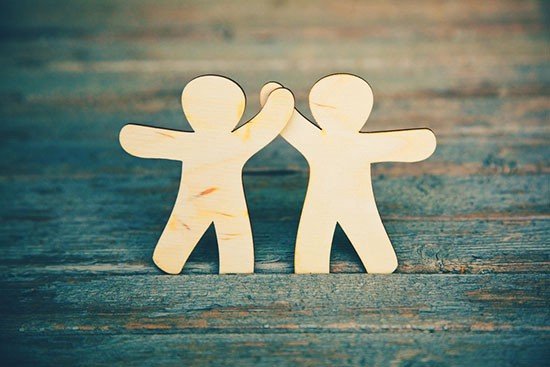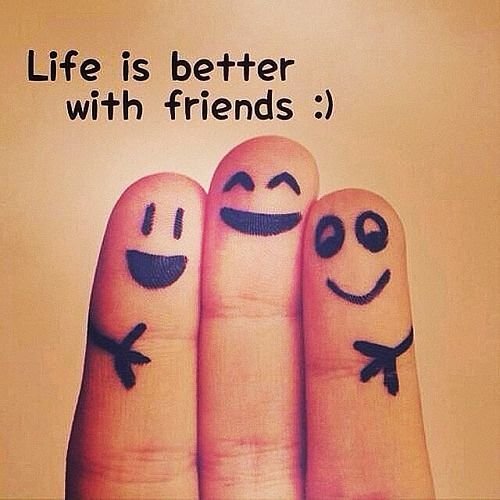The Meaning and Importance of Friendship. Can we Live Without It?
The Meaning and Importance of Friendship. Can we Live Without It?

The importance of friendships for our lives, for our emotional stability and our well-being, was already known in antiquity. Familiarity, empathy and emotional support, all characteristics of true friendship, have a positive effect on our health. The presence of a friend gives us security and helps us to make the right decisions, whether in family, professional or health issues. The presence of a friend can also prevent us from unhealthy behavior.
Studies have shown how positive friendships can be. Those of who have at least one confidante show a significantly better general state of health with a lower tendency to cardiovascular diseases, asthma, high blood pressure and also to psychological problems such as anxiety and depression. We can even expect to live around four to five years longer with friends than without.
We learn to make and maintain friendships and we benefit from this social ability into old age. Time and again we experience how good friends do us, with whom we understand each other, with whom we share interests and views, on which we can rely in all situations.
And even if friendships from earlier have fallen asleep due to frequent professional changes, relocations and private reorientations, it is never too late to renew friendships again or to make new ones. We just shouldn't make the mistake of rushing things. Because intimate friendships with all the familiarity what makes them so valuable must mature like a good wine. A careful approach is just as important as a healthy balance of give and take, telling and listening, laughing and crying.

The decisive factor is not the number of our friendships, but the quality. A really good friend is usually better than ten casual acquaintances. Mother, brother or your own partner can also be our best friends. Despite all the enthusiasm for e-mail contacts and social media networking, frequent and direct encounters, in which we are completely and familiar with each other, experience the voice, body language and facial expressions of our counterpart and share feelings, contribute significantly to an intimate friendship because this is the only way to create a deep connection. A two-hour e-mail exchange with your best friend is not nearly as valuable as an hour together over a leisurely chat in your favorite cafe.
What is Friendship
Few people treat themselves to real friends. Without friends, many people miss the most beautiful experiences in the world. With friends we feel safe and accepted for we are. They make us feel like we are lovable. They help us move the heavy closet when we move. There is something deeper in friendship relationships that we are initially not even aware of. It is a place where we can develop further, where we can find inspiration and support for further growth, for further maturity of our personality. Friendships are often given unexpectedly. We get to know someone on some occasion, and they suddenly make something sound. We sense something like an inner kinship. Similarities can play a role, musical talents, piety styles, the same sibling position, illnesses or even hospital stays or the same professions. It can be the fascination of appearance, the ability of the other to understand you, the language, the other culture, the humor, the pleasant charisma or the ability to talk. Some unconscious impulses arouse in us sympathy for the other. We then say that the chemistry is right.
Some people doesn't have friends or is hardly making one
One reason lies in the lack of relationship skills, the origin of which can often be found in a lack of role models. Again and again we notice that people who have no or hardly any friends had parents who did not set an example. In addition, there is the exaggerated individualism, which makes it difficult to show consideration, to come to terms with and to make compromises. This individualism is constantly reinforced by our mobility, by the demands of a performance society with the associated stress and by media consumption. Sometimes it is also border violations in life in the form of disappointments, emotional, physical or even sexual violence, which have impaired the ability for deep relationships. It may be the spouse who is reluctant to leave her partner up to cultivate friendships. Male friendships also often fail because men are not used to defining their feelings and personal worries. Those who do not open up will not find deep friendships. Those who do not really care about others in the course of life tend to become more lonely and isolated with age.How to uphold friendship
When we meet each other with appreciation and admiration and constantly expand the facets of belonging, something special and very enriching arises. Friendship usually arises where we admit weaknesses, define our feelings, or where one comes up with something for the other. Sometimes it also requires a sacrifice in the time, money, and practical assistance that can support the internal relationship. But what applies to all friendships, they live from openness and trust. Time will always be required to cultivate friendships so that you can tell each other your worlds, stay creative with each other and feel safe with each other. All of this requires a high degree of willingness to trust. Every friendship also needs times of banality, of joint ventures and simply of everyday life.
All too often people speak of friends who do not even know that they are called that. It is and will remain an honorary title and we should use it sparingly and if someone sees the title friendship as too close for the relationship, that is to be accepted, because everyone can only have a certain amount of real friendships.
Risks of Friendship
Excessive expectations, sensitivities, jealousy, bondage or emotional dependencies can quickly creep into good friendship. Superficial conversations, need for control, abuse of openness and sexual desire can often contribute unnoticed to the fact that one drifts apart and destroys a valuable friendship. Friendships don't have to be lifelong. It is normal for different interests and different friends to play an important role at different stages of life. But friendships should always be tidy. Above all, crisis situations involving friendships should be watched carefully and honestly. Only if we look at them honestly will we be able to cope with them and thus contribute to deepening friendship. Another danger is that it is difficult to let the other get up beside you. Friends should always be able to rejoice when the other has experienced something nice or has an advantage. Envy, jealousy, malicious glee must be recognized at the root and eliminated. This sometimes requires a conversation with a neutral person.
It may well be that you have friends of the opposite sex. This can certainly apply to single people, but also to married people. This can only go well as long as no erotic attraction plays a strong role. Particularly honest attention is required here. A marriage must never be jeopardized. But if someone does not find any friends of the same sex at all, that is at least questionable.
Traits of a good friend
- Encourager, see things in a hopeful ways
- Truth lover, open and honest
- Bosom friend, can be entrusted with intimate matters
- Constant friend, flexible and uncomplicated
- Friend from another generation
When to end frienship?
When you are taken advantage
You have often demonstrated your help, helped with moves, comforted you, you were there. But now you need support - but no result, no time. It says succinctly. If that happens often, you should think twice about whether give and take are still in balance in this friendship.If you are not supported
We can only cope with certain situations and phases of life with the help of good friends. Strokes of fate and deaths, for example. Or when the job eats you up, you become unemployed or when your relationship with your partner breaks down. At times like this we want someone who listens to us, gives us good advice, comforts us, and stands by us. But whoever seeks space and makes himself scarce in our most difficult days, in times of greatest need, cannot be friends. Because what then distinguishes him from casual acquaintances? You can and should confidently do without good weather friends.

When you are betrayed
<Probably the worst betrayal is when your boyfriend or girlfriend steals your partner. Or when your own friends talk bad about you behind your back. Then it comes down to a low blow. We expect loyalty and honesty from friendship. If both are missing, you should part.
If you live in constant competition
As soon as you talk about a sense of achievement, do you hear a story that somehow tops your cause and dwarfs it? You never have the feeling that your friend is happy with you. It's always about being even better yourself. A clear case of resentment. Do you need someone like that in your life who just competes with you and wonders who is better?
When you become unimportant
A friend can also do something else. However, if you keep being transferred and the other person has made no effort to keep in touch with you or suggest an alternative appointment, then obviously the priorities have shifted. Your friendship is no longer paramount. It is worth investing in friends and friendships and cultivating these relationships. Everyone agrees on that. Because those who have good friends and many friendships get through life easier. Whether we have friends or not - no matter how good a friend or spouse, no matter how good we are, we can take away the last loneliness that we are especially aware of in life's crisis situations.
